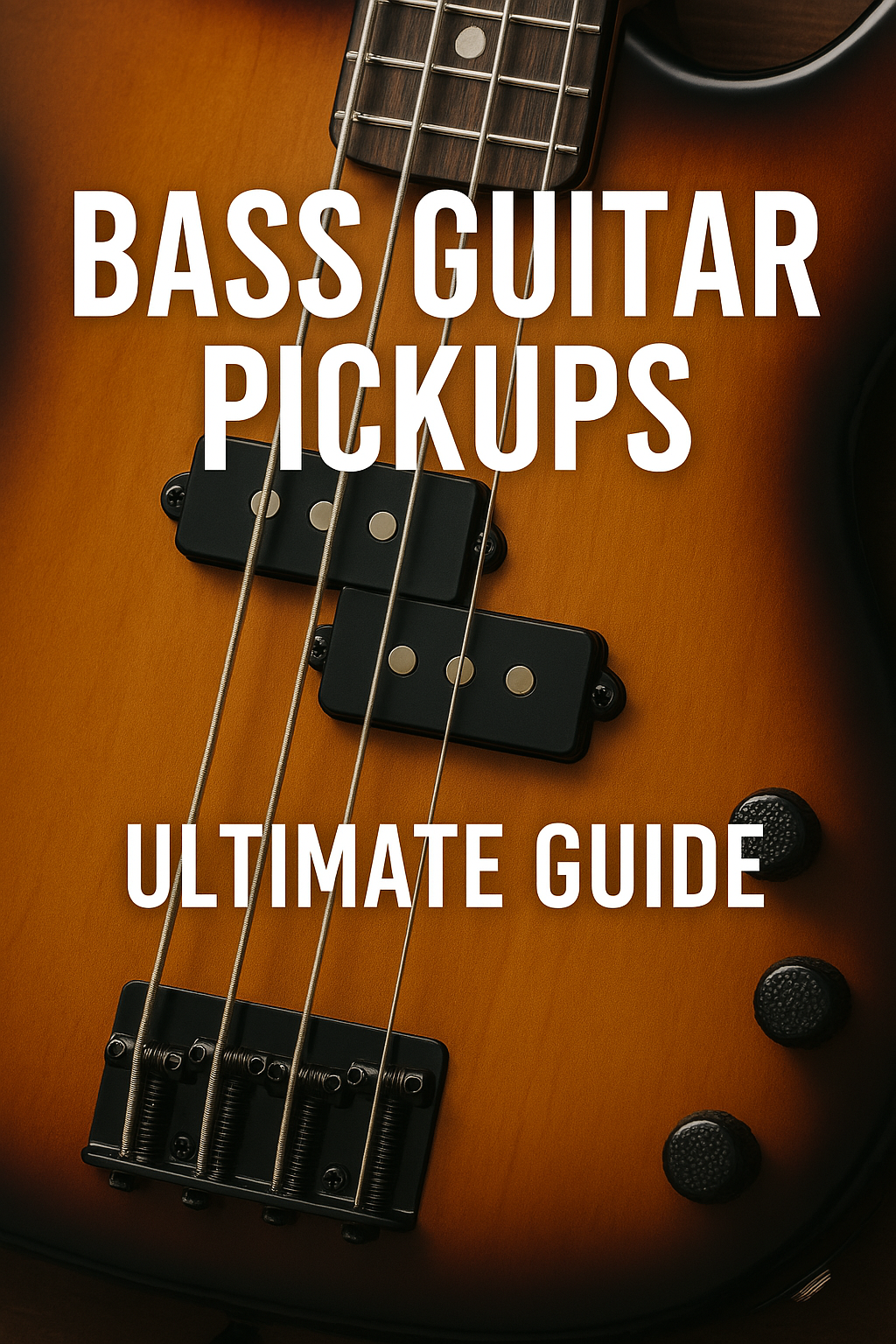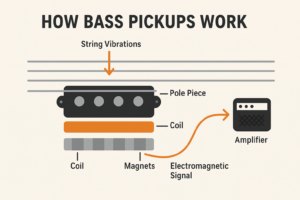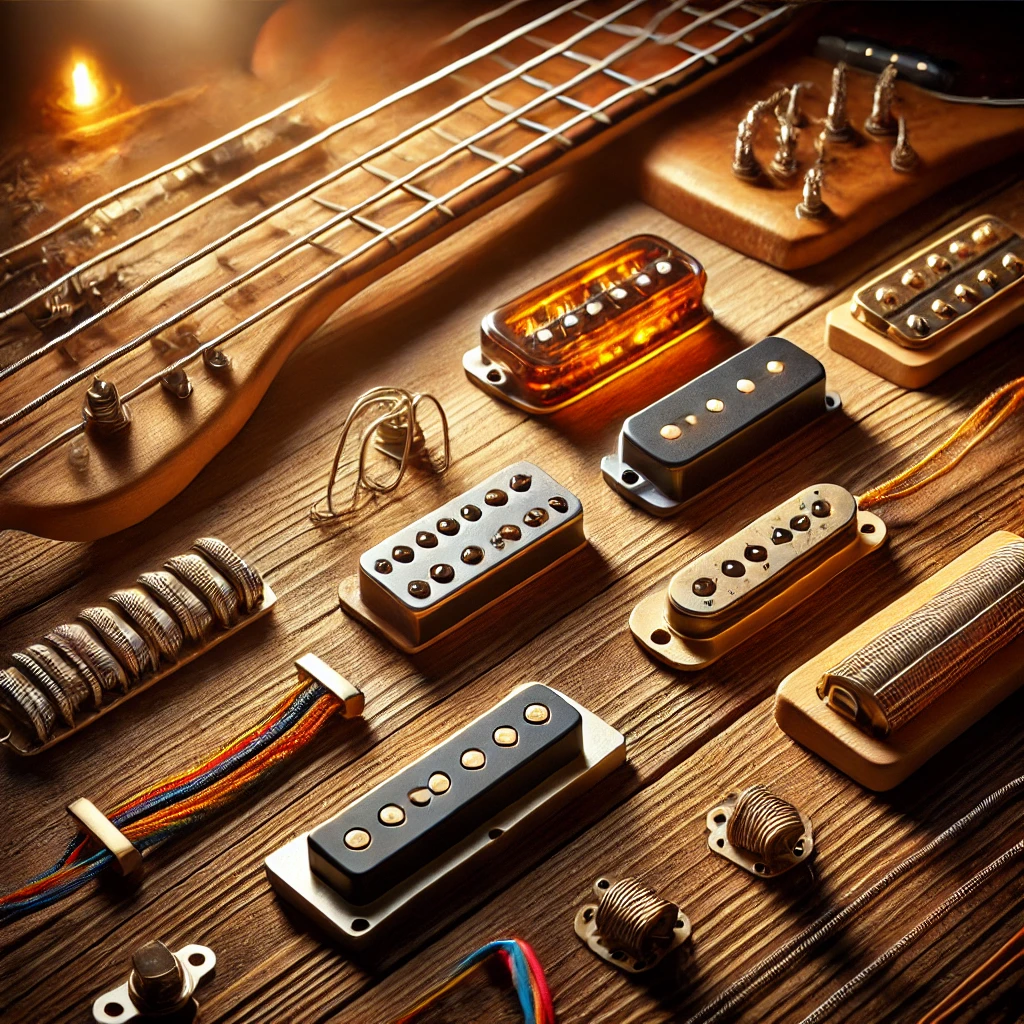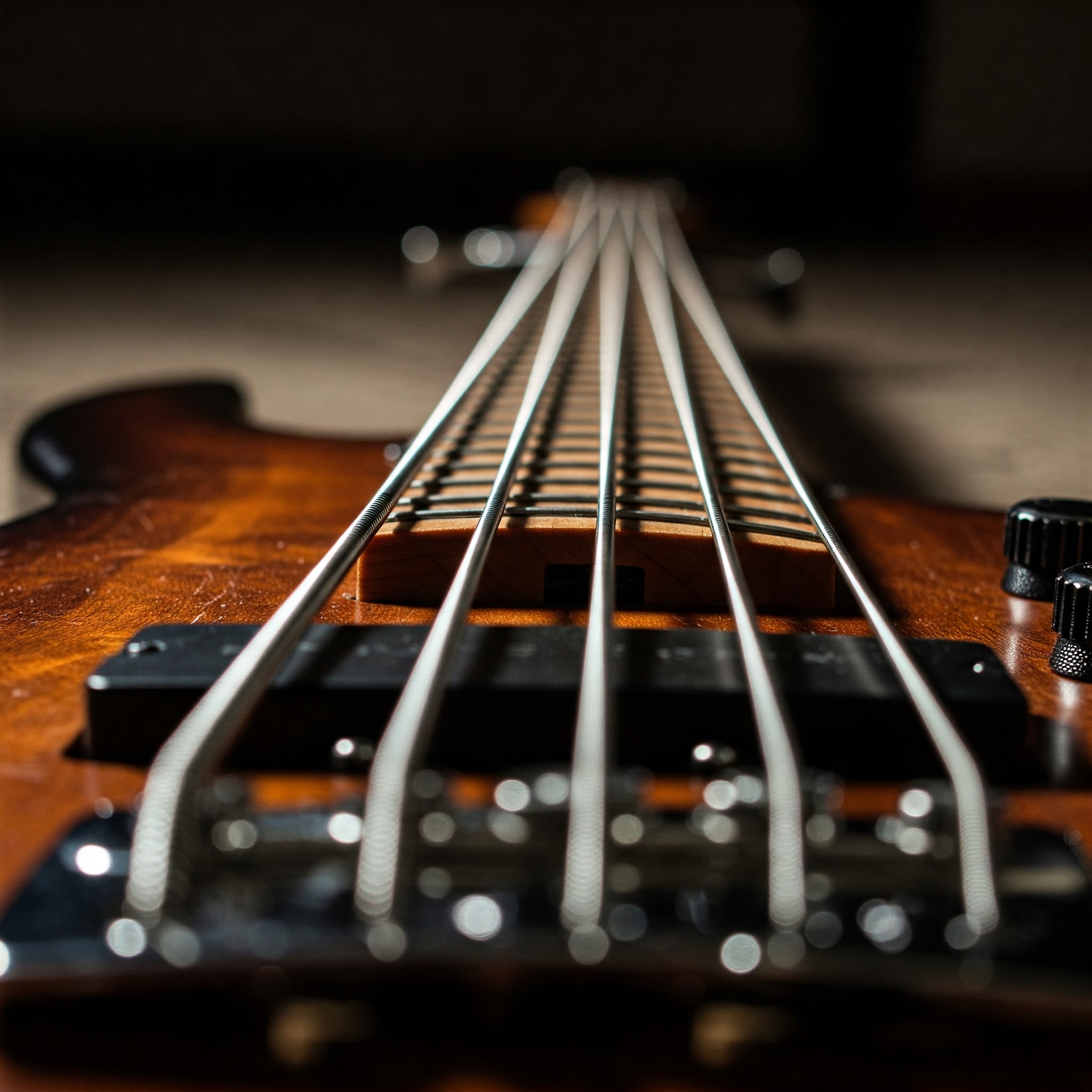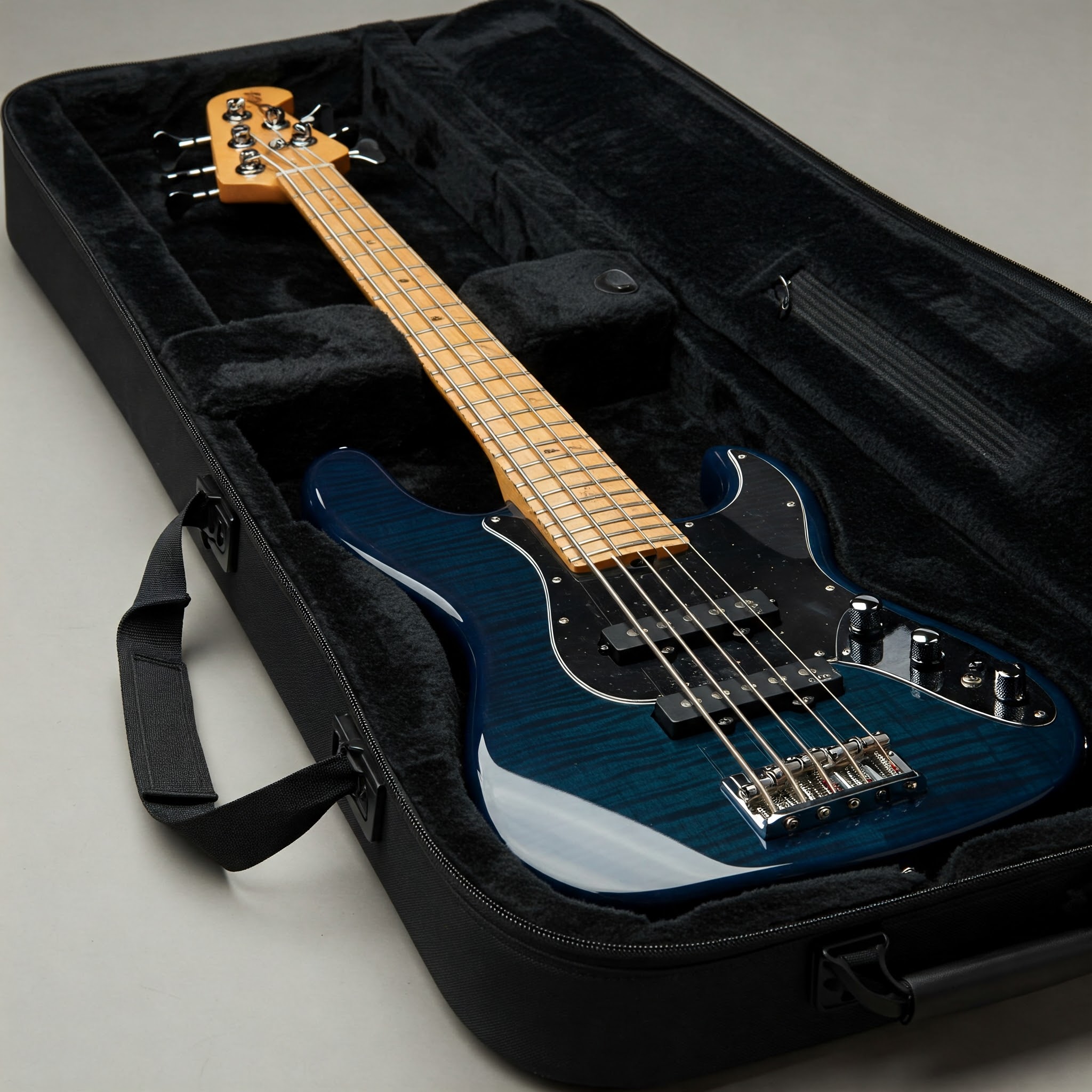The Heart of Your Bass Guitar Sound ⚡
When I first started playing bass guitar, I had no idea how much of an impact pickups would have on my sound. Like many beginners, I was focused on learning techniques and playing songs. It wasn’t until I upgraded the pickups in my first Fender Precision bass that I had that “aha!” moment. The transformation was immediate and striking – suddenly, my bass had clarity, punch, and character that I never knew was possible.
Bass guitar pickups are the unsung heroes of your tone. They’re the components that capture your playing and translate it into electrical signals, ultimately defining your sonic identity. Whether you’re a beginner looking to upgrade your first instrument or a seasoned player seeking that perfect sound, understanding bass guitar pickups is essential to crafting your unique voice on the instrument.
In this comprehensive guide, we’ll dive deep into the world of bass guitar pickups. I’ll share everything I’ve learned through years of experimenting with different options, consulting with luthiers, and performing with various pickup configurations. By the end, you’ll have all the knowledge you need to make an informed decision about the best bass guitar pickups for your playing style, musical genre, and budget.
Understanding Bass Guitar Pickups: The Basics 🔋
Before we get into specific recommendations, let’s establish a foundation of knowledge about bass guitar pickups. This will help you understand the terminology and concepts we’ll be discussing throughout this article.
What Are Bass Guitar Pickups?
Bass guitar pickups are electromagnetic devices that convert the vibrations of your bass strings into electrical signals. These signals are then sent to your amplifier, where they’re transformed into the sound you (and your audience) hear. Think of pickups as the microphones for your bass – they capture your playing nuances and translate them into sound.
Types of Bass Guitar Pickups ✅
There are two main categories of bass guitar pickups:
- Passive Pickups: These are the traditional pickup design that doesn’t require external power. They typically offer a warm, vintage tone with natural dynamics. Passive pickups generally have lower output than active pickups but provide a more organic sound that many players prefer.
- Active Pickups: These pickups incorporate a preamp powered by a battery (usually 9V). Active pickups offer higher output, less noise, and more headroom. They also typically provide onboard EQ controls, allowing you to shape your tone directly from your instrument.
Common Pickup Configurations 🚴♂️
Bass guitars commonly feature these pickup arrangements:
- Single Pickup: Often found in the middle position, like on a Musicman Stingray, or in the neck position, like on some Precision basses.
- Split Coil: The classic P-bass configuration with two coils that function as one pickup, delivering that iconic punchy tone.
- Dual Pickup: Usually combining a split-coil (P-style) pickup in the neck position and a single-coil (J-style) pickup in the bridge position.
- Soapbar: Rectangular pickups often found on modern basses, which can be either active or passive.
- Humbucker: Designed to cancel hum and noise while providing a fuller, thicker tone.
How to Choose the Right Bass Guitar Pickups 🔍
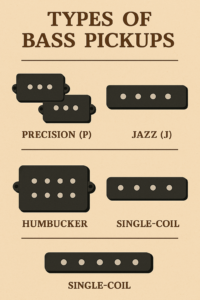
Selecting the perfect bass guitar pickups depends on several factors:
Consider Your Playing Style ✅
- Fingerstyle players often benefit from pickups that emphasize warmth and fullness, like split-coil P-style pickups.
- Slap bassists might prefer J-style single coils or modern active pickups that enhance attack and definition.
- Pick players typically need pickups that capture the sharp attack and articulation of pick playing, such as bridge-position J-style pickups or active humbuckers.
Think About Your Musical Genre 🎵
Different musical styles often call for different tonal characteristics:
- Rock and Metal: High-output active pickups or humbuckers that can deliver punch and clarity.
- Jazz and Fusion: Warm, full-sounding neck pickups with good articulation.
- Funk and R&B: Bright, articulate pickups with good mid-range definition.
- Country and Blues: Vintage-style passive pickups with organic tone and natural dynamics.
Consider Your Bass Guitar 🎸
Not all pickups will fit or sound good in every bass. You’ll need to consider:
- The size and shape of your pickup cavities
- The wood and construction of your bass
- The existing electronics and whether they need to be replaced
- The aesthetic look you want to maintain
7 Best Bass Guitar Pickups for Every Player 🏆
Now that we understand the basics, let’s dive into my top recommendations for bass guitar pickups. I’ve carefully selected these based on sound quality, versatility, build quality, and value for money.
1. Seymour Duncan SPB-3 Quarter Pound P-Bass Pickup ⭐
Best for: Players seeking a powerful, punchy P-bass tone with extra output
The Seymour Duncan SPB-3 Quarter Pound is my go-to recommendation for anyone looking to upgrade their Precision-style bass. I installed these in my backup P-bass for a gig where I needed more presence in a loud rock band, and they delivered spectacularly.
What makes these pickups special is the oversized pole pieces (hence “Quarter Pound”), which capture more string vibration and produce a thicker, more powerful tone than standard P-bass pickups. Despite the increased output, they retain the warm, vintage character that makes P-bass pickups so beloved.
Pros:
- Significantly more output than stock P-bass pickups
- Maintains the classic P-bass tone character but with added punch
- Excellent string-to-string balance
- No battery required (passive design)
Cons:
- Might be too aggressive for players seeking a more vintage tone
- Installation requires soldering skills
2. Fender Custom Shop ’60s Jazz Bass Pickups ⭐
Best for: Jazz bass purists seeking authentic vintage tone
The Fender Custom Shop ’60s Jazz Bass Pickups are the gold standard for players who want that classic Jazz bass sound. When I played through a set of these at a friend’s studio, I was immediately transported back to the golden era of electric bass.
These pickups capture the bright, articulate tone that made the Jazz bass famous. The neck pickup delivers warm fullness, while the bridge pickup provides that characteristic growl. Together, they offer an incredibly versatile tonal palette that works for almost any style of music.
Pros:
- Authentic vintage Jazz bass tone
- Hand-wound for exceptional quality and consistency
- Great dynamic response
- Perfect balance between warmth and clarity
Cons:
- Premium price point
- May not satisfy players looking for modern high-output tones
3. EMG Geezer Butler Signature P/J Set ⭐
Best for: Metal and rock players who need versatility
The EMG Geezer Butler Signature P/J Set combines the best of both worlds – a split-coil P-style pickup in the neck position and a J-style single coil at the bridge. What makes this set unique is that they’re active pickups designed to sound like passive ones, offering the best of both worlds.
I had the chance to try these at a Black Sabbath tribute show, and they nailed Geezer’s powerful, defined tone. The P pickup delivers that thunderous low end, while the J pickup adds definition and growl when needed.
Pros:
- Active electronics with vintage passive tone
- Incredible versatility for various musical styles
- Low noise operation
- Includes complete solderless installation kit
Cons:
- Requires a 9V battery
- Some purists might prefer truly passive pickups
4. Bartolini MK1 Soapbar Bass Pickups ⭐
Best for: Modern players seeking precision and clarity
The Bartolini MK1 Soapbar Bass Pickups represent the cutting edge of bass pickup technology. These active pickups offer incredible clarity and detail, making them perfect for technical players who need to hear every nuance of their playing.
I’ve used these in a 5-string bass for progressive rock and fusion gigs, and the definition they provide is remarkable. Each string comes through with perfect clarity, and the overall tone is balanced and hi-fi without being sterile.
Pros:
- Exceptional clarity and definition
- Wide frequency response
- Great for extended range basses (5 and 6 strings)
- Low noise floor
Cons:
- Requires routing for installation in many basses
- Premium price point
- Needs battery power
5. Nordstrand Big Split Pickup ⭐
Best for: Players seeking a modern take on the P-bass sound
The Nordstrand Big Split Pickup takes the classic split-coil design and pushes it into new territory. This passive pickup delivers increased output and frequency range while maintaining the soul of a traditional P-bass pickup.
When I tried these at a bass convention, I was struck by how they managed to sound both familiar and fresh simultaneously. They have that classic thump but with added clarity and presence that cuts through a mix beautifully.
Pros:
- Modern update to the classic P-bass tone
- Excellent balance across all strings
- Higher output than vintage-style pickups
- No battery required
Cons:
- More expensive than many stock replacement options
- May be too hi-fi for vintage purists
6. Aguilar AG 4J-HC Jazz Bass Pickup Set ⭐
Best for: Jazz bass players seeking a hot, modern tone
The Aguilar AG 4J-HC Jazz Bass Pickup Set takes the classic Jazz bass configuration and supercharges it for contemporary players. These hum-canceling pickups offer significantly more output than vintage designs while eliminating the noise that often plagues single-coil pickups.
I’ve used these for funk and fusion gigs, and they deliver that characteristic J-bass growl with added punch and presence. The hum-canceling design means you can crank the gain without unwanted noise.
Pros:
- Hot output for modern playing styles
- Hum-canceling design eliminates noise
- Maintains the classic J-bass tone character
- Direct replacement for standard J-bass pickups
Cons:
- May overwhelm some passive bass preamps
- Not ideal for players seeking a strictly vintage tone
7. EMG JVX Jazz Bass Pickup Set ⭐
Best for: Players wanting active benefits with passive tone
The EMG JVX Jazz Bass Pickup Set is designed for players who appreciate the sound of vintage passive pickups but want the benefits of active electronics. These pickups use EMG’s X-series preamp technology to deliver a transparent, natural sound with added headroom and low noise.
I’ve recommended these to several students who were struggling with noise issues in their passive Jazz basses but didn’t want to sacrifice their tone. In every case, they were thrilled with how these pickups preserved their sound while solving their problems.
Pros:
- Vintage passive tone with modern active benefits
- Excellent noise rejection
- Solderless installation
- Great for recording environments
Cons:
- Requires a battery
- May not satisfy absolute purists
Comparison: Active vs. Passive Bass Pickups ⚖️
To help you decide between active and passive options, here’s a detailed comparison:
| Feature | Active Pickups | Passive Pickups |
|---|---|---|
| Output Level | Higher | Lower |
| Noise | Very low | Can be noticeable |
| Tone Control | Extensive (often onboard EQ) | Limited to volume/tone knobs |
| Power Source | Battery required | No battery needed |
| Tonal Character | Precise, hi-fi | Warm, organic |
| Ideal For | Modern styles, technical playing | Traditional styles, organic tone |
| Price Range | $100-300+ | $80-250+ |
| Popular Examples | EMG, Bartolini, Nordstrand | Fender, Seymour Duncan |
Ready to elevate your bass sound? Check out these pickups on Amazon today and transform your tone! Your perfect sound is just a click away. ✨
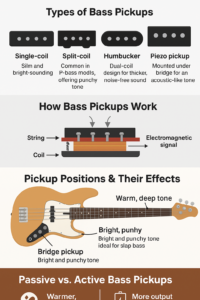
Installation: DIY or Professional? 🔧
Once you’ve chosen your new bass guitar pickups, you’ll need to decide whether to install them yourself or have a professional do it.
DIY Installation Tips ✅
If you’re comfortable with basic soldering and electronics, installing bass pickups can be a rewarding DIY project:
- Document everything before you start: Take photos of your current wiring setup.
- Get the right tools: You’ll need a soldering iron, solder, wire cutters, screwdrivers, and possibly a multimeter.
- Follow a wiring diagram: Use the manufacturer’s provided wiring diagram or find one online.
- Take your time: Rush jobs often lead to mistakes.
- Test before reassembling: Check that everything works before putting your bass back together.
Many modern pickup sets (like EMGs) come with solderless installation kits, making the process much easier for beginners.
When to Hire a Professional
Consider professional installation if:
- You’re not comfortable with soldering
- Your bass has complex electronics
- You’re installing pickups in an expensive instrument
- The installation requires routing or modification of your bass
A professional setup after installation is always a good idea to ensure your bass plays and sounds its best with the new pickups.
Optimizing Your Bass Tone: Beyond Pickups 🎛️
While pickups are crucial to your tone, they’re just one part of the equation. To get the most from your new bass guitar pickups, consider these additional factors:
Strings Matter
Different strings can dramatically affect how your pickups sound:
- Roundwound strings offer brightness and articulation
- Flatwound strings provide a warm, vintage tone
- Fresh strings will always give you the fullest frequency response
I’ve found that changing strings before judging new pickups gives you a much better sense of their true character.
Amplification Considerations
Your amp and cabinet significantly impact how your pickups translate to audible sound:
- Active pickups may require less gain from your preamp
- Some preamps pair better with specific pickup types
- Experiment with your EQ settings when you install new pickups
Playing Technique
Different playing techniques can highlight various qualities of your pickups:
- Try varying your picking or plucking position
- Experiment with playing force and dynamics
- See how the pickups respond to techniques like slapping, tapping, or using a pick
Frequently Asked Questions About Bass Guitar Pickups 🤔
Can I mix passive and active pickups in the same bass?
Generally, it’s not recommended to mix passive and active pickups in the same instrument. They have different output levels and impedance characteristics that make them difficult to balance. However, some specialized systems (like those from Audere) allow you to run both through an onboard preamp.
Will changing my pickups make my cheap bass sound like an expensive one?
Pickups can significantly improve your tone, but they’re just one component of your overall sound. While upgrading pickups on an inexpensive bass will make a noticeable difference, other factors like wood quality, construction, hardware, and setup also contribute to the sound of premium instruments.
How long do bass pickups last?
Quality bass pickups can last decades with proper care. Passive pickups have few components that can fail, while active pickups might require occasional electronic maintenance. The most common issue is environmental damage from humidity or corrosion, which can be prevented with basic care.
Can I install Jazz bass pickups in a Precision bass (or vice versa)?
This modification requires routing new pickup cavities in your bass body, as P and J pickups have different shapes and sizes. While it’s possible, it’s best handled by a professional luthier and will permanently alter your instrument.
How often should I change the battery in active pickups?
For regular players, changing your battery every 3-6 months is a good practice. Always disconnect your cable from your bass when not playing to prevent the battery from draining, as the cable connection activates the preamp circuit.
Conclusion: Finding Your Perfect Bass Tone 🌟
The quest for the perfect bass tone is deeply personal. What works for one player or musical style might not be ideal for another. The beauty of bass guitar pickups is that they offer a relatively affordable way to dramatically change your instrument’s voice without buying a new bass.
Whether you choose the thunderous punch of the Seymour Duncan Quarter Pounds, the classic thump of Fender Custom Shop pickups, or the modern clarity of Bartolini soapbars, your new pickups will open up sonic possibilities that inspire your playing and enhance your musical voice.
Remember that the “best” pickup is ultimately the one that sounds best to your ears and suits your musical needs. Don’t be afraid to experiment and trust your own taste over specifications or marketing claims.
I encourage you to think of pickup selection as part of your artistic expression. Just as a painter chooses specific brushes and colors, you’re selecting the tools that will help translate your musical ideas into sound.
Ready to transform your bass sound? The perfect pickups are waiting for you on Amazon. Click through any of the recommended options above and start your journey to better tone today! 🚀
More FQAs:
📌 What Is the Difference Between Single-Coil and Humbucker Bass Pickups?
✅ Single-coil pickups offer a bright, clear tone but can be susceptible to noise. Humbuckers use two coils to cancel hum, providing a warmer, fuller sound with reduced interference…
📌 How Does Pickup Placement Affect Bass Guitar Tone?
✅ Pickup placement influences tone significantly: neck-position pickups yield a warmer, bass-heavy sound, while bridge-position pickups produce a brighter, treble-focused tone…
📌 Can I Mix Different Types of Pickups on My Bass Guitar?
✅ Yes, combining different pickup types, like a split-coil in the neck position and a single-coil at the bridge, can offer a versatile range of tones, blending warmth with clarity…
📌 What Are Soapbar Pickups in Bass Guitars?
✅ Soapbar pickups are rectangular-shaped and can house various internal designs, including single-coil or humbucking configurations, offering a wide tonal range and often used in modern basses for their versatility…
📌 Do Active Pickups Require Special Maintenance Compared to Passive Ones?
✅ Active pickups need a battery to power their preamp, requiring periodic battery checks and replacements. Passive pickups, lacking this circuitry, don't require such maintenance…
Recommended for You:
- Bass Flutes: 7 Amazing Facts About This Powerful Instrument in 2025
- 10 Best American Bass 12 Subwoofers That Will Transform Your Audio Experience in 2025
- Jazzmaster Bass: 7 Incredible Reasons Musicians Choose This Powerhouse Instrument
Disclaimer: This article contains affiliate links. If you purchase products through these links, we may earn a small commission at no additional cost to you.
